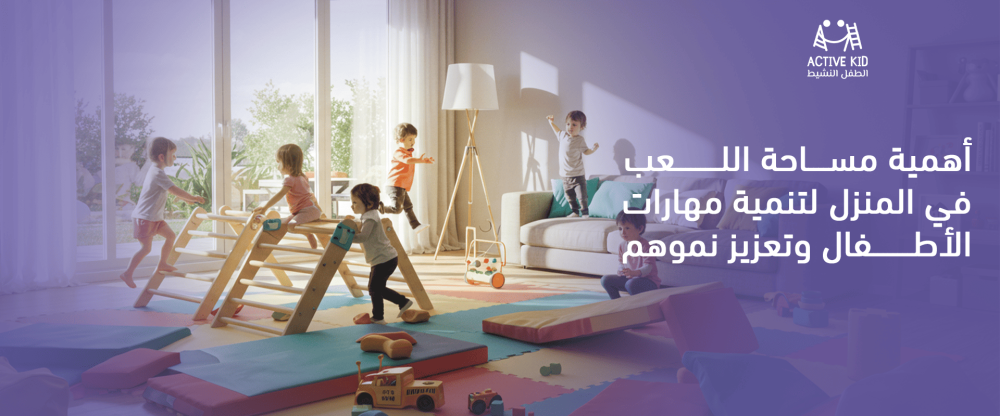The home plays a role beyond just being a place to live; it is a fundamental environment that influences children's skill development and supports their growth. Playing indoors is not just entertainment; it is an educational experience that helps children develop their physical, mental, and social abilities.
Creating a safe play space at home gives children the opportunity to explore and learn freely, and enhances creativity and self-confidence. In this article, we'll discuss the importance of a play space, its psychological benefits, how to set it up, the difference between free and guided play, and tips for parents on incorporating playtime into their child's daily routine.
Transform a corner of your home into a world of fun and learning. Discover the active child's collection of sports complexes and movement games that develop your child's skills and provide him with unforgettable moments.
How important is it to have a play area inside the house?
Having a dedicated play space inside the home is not a luxury, but rather a basic necessity that directly impacts children's skill development and supports their growth at various age levels. This space provides children with a safe and suitable environment for experimentation, exploration, and learning, away from the dangers they may encounter outside.
1- Safe and comfortable environment:
A play area inside the home provides a child with a protected environment where they can move freely, engage in various activities, and express themselves without fear or anxiety. This sense of security encourages the child to explore new skills, whether physical or mental.
2- Enhancing independence:
Having a private space gives your child a sense of independence, as they can choose the toys and activities they want, which boosts their self-confidence and encourages them to make their own decisions.
3- Supporting the child's comprehensive development:
Playing in a designated space contributes to improving motor skills, fostering creative thinking, developing social skills, and fostering emotional intelligence. All of these aspects directly contribute to children's balanced development .
4- Creating a stimulating environment for learning:
A well-equipped play area creates an informal learning environment where children combine fun and learning, enhancing the brain's ability to absorb information and transform it into practical skills.
5- Organizing the daily routine:
A play area helps organize a child's time, as specific times can be allocated for free and guided play, creating a daily routine that continuously enhances the development of children's skills .
Psychological benefits of a play area for children:
Play is more than just a physical activity; it's a fundamental process that profoundly impacts a child's mental and emotional health. Having a dedicated play space at home allows children the opportunity to freely express themselves, which contributes to enhancing their mental health and developing a balanced personality.
1 - Boosting self-confidence: Free play in a safe environment gives children the opportunity to make their own decisions, choose their favorite games, and implement new ideas. These experiences enhance a child's sense of competence and boost their self-confidence, an important element in developing children's skills and building a strong personality.
2 - Relieving stress and pressure: Children face psychological pressures, whether at school or in their daily lives. Free play in a designated space helps them release their emotions in a natural and healthy way, reducing anxiety levels and enhancing their sense of comfort and reassurance.
3 - Developing social and emotional skills: When a child plays with siblings or friends at home, they learn skills such as cooperation, negotiation, and mutual respect. These experiences enhance emotional intelligence and teach children how to express their feelings and deal with the feelings of others.
4 - Enhancing creativity and thinking: Playing in a prepared space supports imagination and critical thinking, allowing children to experiment with different roles and solve problems in innovative ways. This process is crucial to children's development because it builds the foundations for future creative thinking.
5 - Improving overall mental health: Regular play in a safe space helps children build a healthy routine, which enhances their sense of happiness and inner contentment. This positively impacts their mood, behavior, and ability to learn.
How does a play space help foster creativity?
Creativity is an essential skill that children need not only in play, but throughout their entire lives. Providing a dedicated play space at home provides children with a stimulating environment based on freedom and experimentation, which significantly contributes to developing children's skills and fostering their mental and creative growth.
- Freedom of expression and experimentation: When a child has a dedicated space to play, they have the freedom to experiment with new ideas without fear of making mistakes or being criticized. This boosts their self-confidence and encourages their brain to think in innovative ways, which is essential for developing creative skills.
- Developing critical thinking and problem-solving: A play space gives children the opportunity to test different ideas and explore multiple solutions to situations they encounter during play. This type of play promotes critical thinking and encourages children to seek innovative solutions, which contributes to children's mental development.
- Developing imagination and creativity: Free play in a dedicated environment helps children build their own worlds in their imagination, such as inventing new games or designing stories and characters. This type of experience strengthens the brain's ability to think creatively, which is an important part of developing intellectual and social skills.
- Encouraging self-learning: A dedicated play space encourages children to learn through experience and practice. When children choose to play in a certain way, they discover new skills and develop their personal abilities, which positively impacts the overall development of children's skills.
- Stimulating curiosity and exploration: Curiosity is the primary driver of creativity. A dedicated play space provides a child with a safe environment where they can explore new tools and toys, stimulating their curiosity and motivating them to learn and experiment in innovative ways.
Ideas for creating a safe play area inside the home:
Creating a safe play area at home isn't just about providing a place to play. Its design must be carefully thought out to create an environment that fosters children's skill development and promotes their overall development. Here are some ideas that can help parents and teachers prepare this space:
1 - Choosing the right location: It's important to choose an area of the home that is safe and free from hazards, such as corners free of wires or sharp objects. It's preferable to place the area close to parental supervision to ensure safety and constant monitoring.
2 - Secure the floor: Soft flooring, such as carpet or rubber flooring, helps protect your child while playing, especially when running or jumping. A comfortable floor also encourages your child to play for longer periods.
3 - Provide good lighting: Good lighting is essential for creating a comfortable and safe environment. Natural light can be used during the day and appropriate night lighting can reduce visual stress.
4 - Allocate diverse spaces: The play area can be divided into different zones: a motor play area, a drawing and creativity area, and a reading or quiet play area. This diversity helps children develop multiple skills and enhances their overall development .
5 - Integrate educational and creative elements: Adding educational tools such as books, puzzles, art tools, and games that develop thinking skills makes the play space a fun learning environment, which enhances children's mental and social development.
6 - Maintaining organization and cleanliness: Organizing and storing toys in an easy-to-use manner enhances the child's sense of responsibility and encourages him to keep the play area clean and safe.
7 - Involving the child in preparing the space: Giving the child the opportunity to participate in choosing the equipment and play space enhances his sense of ownership and encourages creativity, in addition to developing his planning and decision-making skills.
The difference between free play and guided play at home:
Indoor play is not just a fun time; it is an essential tool for developing children's skills and supporting their development. To better understand how play can impact a child's development, it is important to distinguish between two main types: free play and guided play, each of which differs in purpose, method, and benefits.
1- Free play:
Free play is an activity that a child chooses on their own, without direct adult intervention. This type of play relies on imagination, personal experience, and exploration.
The importance of free play:
- Promotes creativity and critical thinking.
- It helps develop children's creative skills.
- Builds self-confidence through trial and error.
- Allows the child to express his feelings and thoughts freely.
2- Guided play:
Guided play is an activity guided by parents or teachers, who set goals and rules or provide structured activities. The goal is often to teach a specific skill or develop a specific aspect of a child's development.
The importance of guided play:
- Promotes discipline and adherence to rules.
- Helps learn specific skills in an organized manner.
- Supports targeted learning such as learning numbers or motor skills.
- It promotes cooperation and teamwork if played in a group.
3- Comparison between free play and guided play:
Tips for parents to incorporate playtime into their child's daily routine:
Playing indoors isn't a luxury; it's an essential part of developing children's skills and supporting their overall development . Therefore, it's important that play be part of a child's daily routine, not a random activity. Here are some top tips to help parents integrate playtime effectively into their children's lives:
1 - Allocating a fixed time every day for playing helps the child feel safe and organized, and also promotes adherence to routine.
2- Diversifying play activities between free play and guided play ensures the development of different skills in the child.
3- Involving the child in planning and choosing play activities enhances his independence and makes him more enthusiastic about participating.
4 - Integrate play into daily activities, such as using a number game while sorting tools, or turning household chores into fun games. This naturally connects learning to play and increases its effectiveness.
5 - Create a stimulating and safe environment. Prepare a suitable and safe play space inside the home that encourages the child to play freely and explore his skills.
6 - Participating in play with a child gives them a sense of support and care, and strengthens the emotional bond between them. Playing with parents also helps children learn social and behavioral skills in a practical way.
7 - Monitor and evaluate play time Parents should observe how the child spends play time and provide support or guidance when needed.
8- Encourage outdoor play in addition to indoor play. This broadens a child's horizons and provides them with a broader experience to develop their skills.
Conclusion:
A home play space is not just a place for entertainment; it is an educational and developmental environment that directly impacts children's skill development and enhances their physical, mental, and social growth . By providing a safe and appropriate space, parents can transform playtime into a rich learning opportunity that combines freedom, creativity, and structured guidance.
Ultimately, investing in a safe and supportive play space at home is not a luxury, but rather an essential step in building a strong foundation for your child's future, ensuring a healthy and safe environment that helps them learn, discover, and grow in a holistic way.

